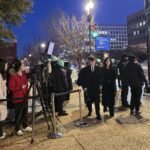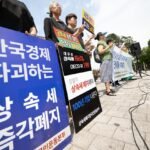
South Korean companies building plants in the US are reassessing their projects and overhauling workforce supply after the US authorities last week detained some 300 Korean workers in a raid on a joint venture between Hyundai Motor Co. and LG Energy Solution Ltd. in the US state of Georgia.
According to a poll of 14 major South Korean companies on Monday, 57.1% of the respondents said they may adjust ongoing US projects, while 16.7% are reviewing US investments for possible delays in construction and plant opening.
They cited difficulties in dispatching South Korean specialists on time to their US operations as the main reason for reassessing their US projects.
The US Immigration and Customs Enforcement (ICE) alleged that many of those detained at the site of the Hyundai-LG Energy joint venture were fradulentely using visitor visas to work at the site, in violation of their visa terms.
In a move to ease the fallout of the detention, US President Donald Trump said on Sunday that foreign companies need to hire and train US workers and respect immigration laws.
But many Korean companies remain skeptical of his remarks.
“We need Korean professionals, but who knows when the visas will be issued,” said a Korean company official.
The Korean nationals detained are set to be released and return home in a chartered plane under a “voluntary departure” process.
COST INCREASE
According to the survey, 57.1% of respondents projected an increase in costs related to US investments, with 28.6% anticipating a minimum rise of 10%, 7.1% expecting up to 30% and 21.4% forecasting a rise between 10% and 30%.

Due to the visa problems, 64.3% of surveyed companies have either completely suspended business travel using the Electronic System for Travel Authorization (ESTA) and short-term business (B-1) visas, or implemented internal guidelines requiring employees to obtain L-1 visas for trips longer than one month.
Their top requets to the US government is the creation of a separate visa quota for skilled Korean professionals (64.3% of the respondents).
It is followed by calls to expand the L1 visa program for Korean expatriates or international employees (21.4%) and to increase the H-1B visa quota for Koreans holding a bachelor’s degree or higher (14.3%).
Currently, the US grants E-4 visas without quota limits to citizens of Canada and Mexico, while annual caps are set at 10,500 for Australia, 5,400 for Singapore and 1,400 for Chile.
Industry observers say that semiconductor, battery and transformer makers to be hit the hardest due to the lack of local experts in those fields in the US.
Some analysts also warn that the MASGA project, short for Make American Shipbuilding Great Again and a symbol of the US-South Korea cooperation, could also face setbacks.
Meanwhile, 64.3% of surveyed companies see little impact from the detention of the Korean nationals on their US investment plans, while 14.3% said it would have a very negative impact on their future investments in the world’s largest economy.
(The companies that participated in this survey include Hyosung Heavy Industries Co.; Hyundai Motor Co.; LG Energy Solution Ltd.; Samsung SDI Co.; LS Electric Co.; LS Cable & System Ltd.; Hanwha Ocean Co.; LG Chem Ltd.; SK Hynix Inc.; SPC Samplip Co.; Hanwha Solutions Co.; SK On Co.; LG Electronics Inc.; and Hankook Tire & Technology Co.)
By Jin-Won Kim and Woo-Sub Kim
Jin1@hankyung.com
Yeonhee Kim edited this article.















